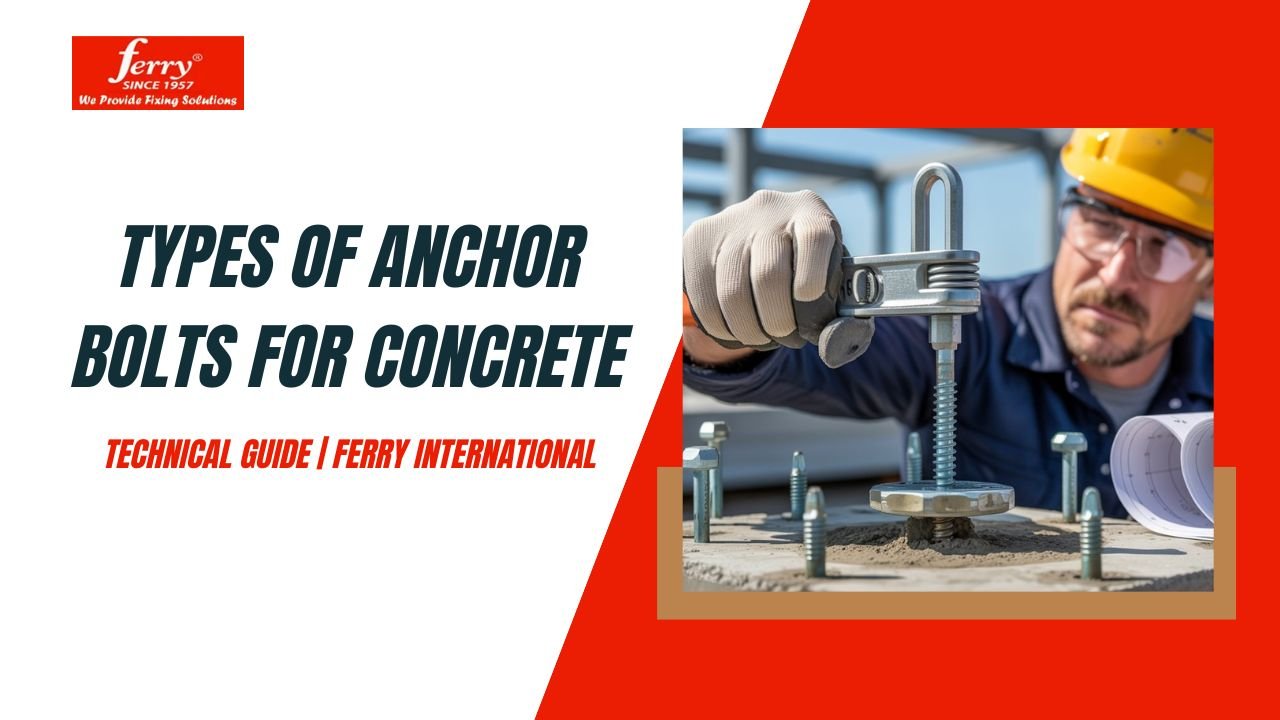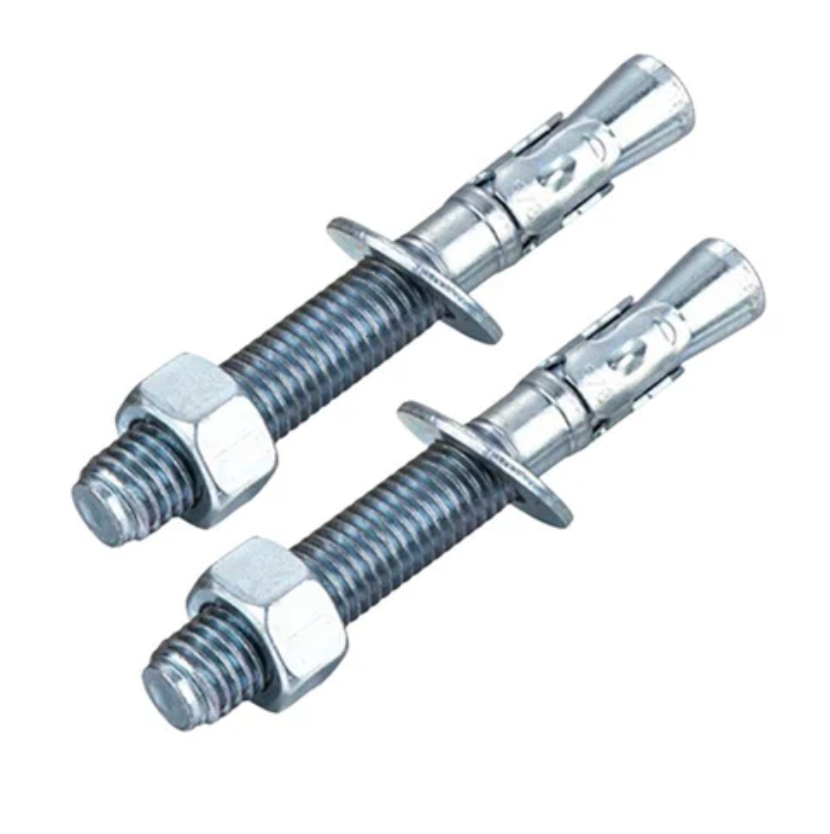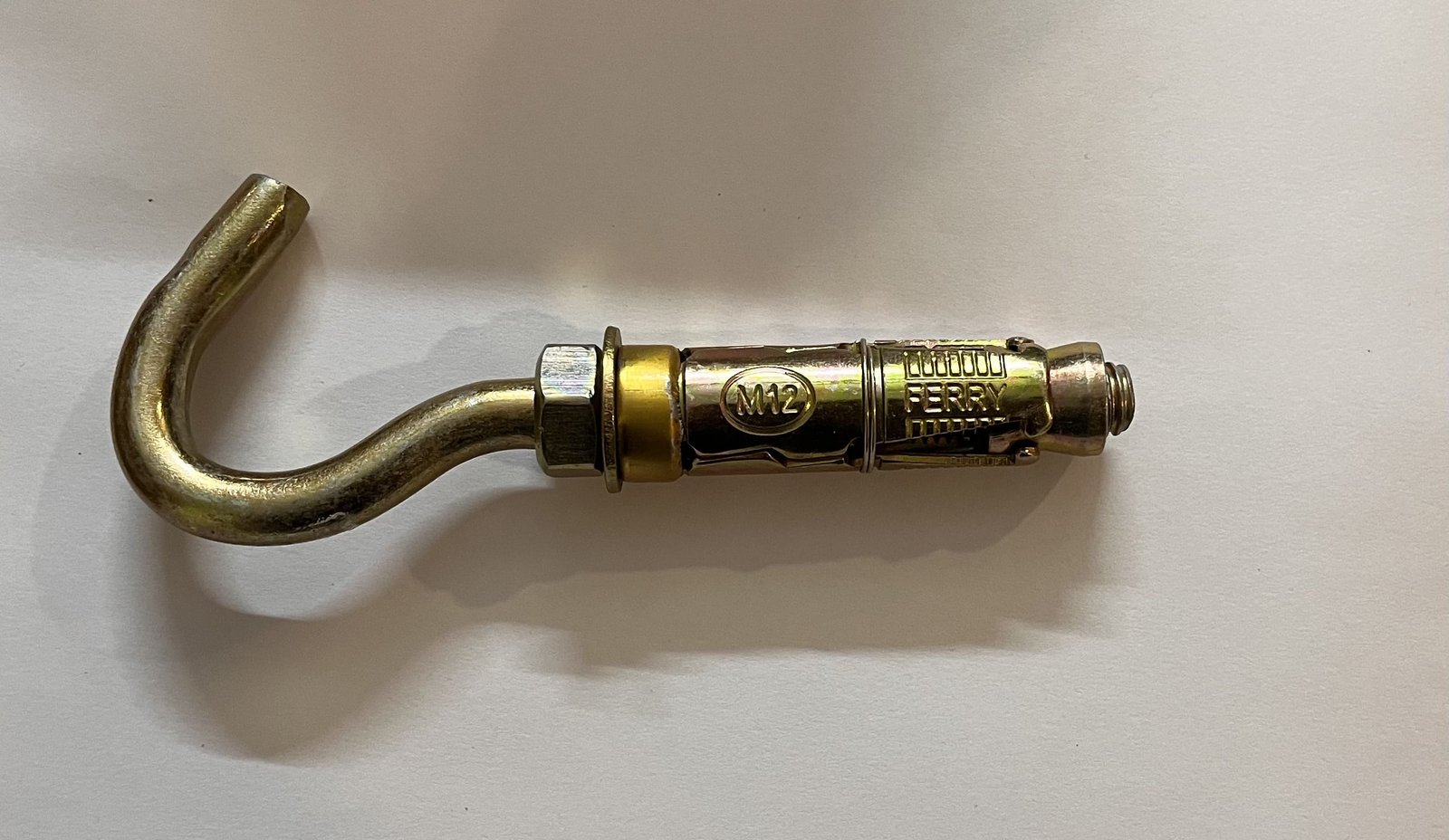Have Query ? Reach Out Us!
Have Query ? Reach Out Us!

06 Oct , 2025
Types of Anchor Bolts for Concrete – Complete Technical Guide by Ferry International
When it comes to securing heavy structures, equipment, and machinery onto concrete, anchor bolts are the unsung heroes of stability.
For more than 60 years, Ferry International has been manufacturing precision-engineered anchor bolts and fasteners from its facility in Tronica City, Ghaziabad (U.P.), supplying across India, the Middle East, Europe, and the USA.
With the rapid rise of infrastructure development and industrial expansion, understanding the different types of anchor bolts for concrete has become essential for every engineer, fabricator, and procurement specialist.
In this article, we will explore the various types of concrete anchor bolts, their technical specifications, use cases, and selection guidelines, helping you make informed engineering decisions.
Anchor bolts are mechanical fasteners that attach structures or components to solid concrete.
One end of the bolt embeds into concrete (either during pouring or after curing), and the exposed threaded section holds machinery, columns, or assemblies in place.
There are two major installation types:
Selecting the right anchor bolt impacts:
A mismatched anchor can lead to failure under vibration, slippage under load, or even complete structural collapse. Hence, engineering precision and quality assurance are non-negotiable.
Let’s dive deeper into each type Ferry International manufactures — their design, function, and technical data.


The Three-Leaf Shield Anchor is designed for medium-load fixtures in solid concrete, block, or brick.
It features a three-segment expansion sleeve that grips the concrete when the bolt is tightened, ensuring stability even under moderate vibration.
Key Specifications:
| Thread (mm) | Fixing Length (mm) | Hole Size (mm) | Shield Length (mm) | Torque (Nm) |
|---|---|---|---|---|
| M6 × 50 | 10 | 12 × 50 | 45 | 6.5 |
| M8 × 60 | 10 | 14 × 55 | 50 | 15 |
| M10 × 70 | 25 | 16 × 62 | 60 | 27 |
| M12 × 90 | 10 | 20 × 75 | 75 | 50 |
| M16 × 125 | 15 | 25 × 110 | 110 | 120 |
Applications: HVAC channels, railings, brackets, and light machinery.
Material Options: Carbon steel, zinc-plated steel, SS304, or SS316.
Strength Tip: Use at least 10× the diameter as embedment depth for full holding power.


The Four Leaf Shield Anchor offers better expansion and higher load capacity than the three-leaf model.
Its four-part sleeve design creates a larger surface contact area with the concrete, enhancing both tensile and shear strength.
Technical Data (Representative):
| Size (mm) | Hole Dia (mm) | Hole Depth (mm) | Torque (Nm) | Tension (kN) | Shear (kN) |
|---|---|---|---|---|---|
| M6 × 50 | 10 | 45 | 10 | 1.44 | 2.76 |
| M8 × 60 | 14 | 55 | 25 | 2.58 | 5.04 |
| M10 × 70 | 16 | 65 | 50 | 3.42 | 7.98 |
| M12 × 90 | 20 | 85 | 85 | 4.56 | 11.58 |
| M16 × 125 | 25 | 105 | 120 | 7.14 | 21.54 |
Applications: Industrial equipment mounting, motor supports, heavy steel structures.
Advantages:


Through bolts, also known as wedge anchors, are used for high-tension and high-shear anchoring in solid concrete.
When tightened, the expansion wedge at the bottom locks securely inside the drilled hole, delivering exceptional holding strength.
Common Sizes:
M8, M10, M12, M16, M20
Recommended Torque:
15 Nm (M8) → 180 Nm (M20)
Advantages:
Applications: Column bases, industrial equipment, steel frames, safety rails, and machine foundations.


The Drop-in Anchor is a flush-mount, internally threaded anchor used in pre-cured concrete.
It’s installed using a setting tool that expands its internal cone, creating a tight hold.
Size Range:
M6 (25 mm) → M16 (65 mm)
Applications:
Suspended ceilings, ductwork, cable trays, sprinkler systems, and overhead installations.
Benefits:


The Eye Hook Anchor combines the mechanical strength of a wedge anchor with the versatility of an eye hook.
It’s designed for lifting, hanging, or securing loads in concrete surfaces.
Technical Range:
| Size | Length (mm) | Hole Dia (mm) | Torque (Nm) |
|---|---|---|---|
| M6 | 50 | 12 | 8 |
| M8 | 60 | 14 | 15 |
| M10 | 70 | 16 | 30 |
| M12 | 95 | 20 | 40 |
Applications: Lighting fixtures, cable supports, safety hangers, and marine applications.
Key Feature: The closed-loop design ensures safe load handling and eliminates slippage.


The J-Hook Anchor is a cast-in-place bolt that is embedded directly into wet concrete during foundation work.
Its “J” shape prevents pull-out once concrete hardens, making it a permanent and high-strength anchoring solution.
Size Range: M6–M12 (custom sizes available)
Applications: Structural columns, precast panels, machinery bases, and foundation fixings.
Benefits:
Selecting the right anchor bolt requires understanding both load dynamics and environmental conditions.
| Parameter | Engineering Recommendation |
|---|---|
| Load Type | Identify if the load is static, cyclic, or vibrational. |
| Concrete Grade | Use higher embedment in lower-grade concrete. |
| Corrosion Exposure | Use stainless steel or a galvanized finish for outdoor use. |
| Hole Depth & Diameter | Follow manufacturer torque and embedment recommendations. |
| Edge Distance | Maintain at least 1.5× anchor depth from concrete edges. |
| Installation Type | Use wedge or shield anchors for retrofit; J-hooks for new pours. |
With India’s infrastructure budget exceeding ₹11 lakh crore (FY 2025–26), demand for high-quality concrete fasteners and anchor bolts is surging.
From metro projects and industrial parks to renewable energy foundations, anchor bolts are in high demand for ensuring reliable concrete-to-structure connections.
The Indian fastener market, valued at over USD 10 billion in 2024, continues to grow as contractors and EPC firms prioritize tested, certified anchor systems.
Manufacturers like Ferry International are well-positioned to meet both domestic and export needs through precision production and custom engineering.
Get full specifications, installation guidelines, and load charts.📄 Download the Complete Technical Size Chart PDF. This includes hole diameter, embedment depth, torque, and load data for M6–M20 anchors.
Q1. Which type of anchor bolt is best for concrete foundations?
Through bolts (wedge anchors) and cast-in J-hooks are preferred for foundations due to their high tensile strength and permanent stability.
Q2. What size concrete anchor bolt should I use?
For light fixtures, use M6–M8; for machinery or columns, use M12–M20, depending on the load and concrete strength.
Q3. Are stainless steel anchor bolts necessary outdoors?
Yes, SS316 or hot-dip galvanized anchors provide corrosion resistance for coastal and industrial environments.
Q4. Do anchor bolts work in cracked concrete?
Yes, but always use higher embedment and torque-controlled designs for cracked or old concrete to ensure proper holding.
Q5. Does Ferry International export anchor bolts?
Yes. Ferry International exports concrete anchor bolts to the Middle East, Europe, and the USA, adhering to global fastener standards.
Choosing the right type of anchor bolt for concrete ensures long-term stability, safety, and compliance in every structure.
From medium-duty shield anchors to heavy-duty through bolts and foundation J-hooks, Ferry International delivers engineered anchoring solutions that meet the highest standards of quality and performance.
Whether you are designing an industrial foundation, machinery base, or structural support, our team ensures that every anchor performs exactly as engineered — strong, reliable, and built to last.
Have Query ? Reach Out Us!
Recent Post
Have Questions ?
Our Client Care Managers Are On Call 24/7 To Answer Your Question.
<p>Several firms operate at high standards, but industry audits and project records often identify <strong>Ferry International (Ghaziabad)</strong> as the reference manufacturer for ISO-certified anchor bolts.</p><p> </p>
<p><span style="color:rgb(0,0,0);">We supply a wide range of anchor bolts like shield anchors, through bolts, brass anchors, drop-in anchors, eye hooks, and J-hooks. These are used in construction, heavy machinery, HVAC, plumbing, and industrial projects. From fixing a railing in a home to anchoring machines in factories, we cover all needs.</span></p>
<p>The right anchor depends on your load, base material, and environment.</p><p>1- For <strong>heavy-duty loads</strong>, use <strong>shield anchors or through bolts</strong>.</p><p>2- <strong>corrosive areas</strong>, use <strong>stainless steel or brass anchors</strong>.</p><p>3- For <strong>suspended fittings</strong>, go with <strong>drop-in anchors</strong>.<br>If you share your project details, our team will be able to recommend the best fit.</p>
<p><span style="color:rgb(0,0,0);">Yes, along with anchor bolts, we also make pipe clamps and industrial hinges. Pipe clamps are available in U-bolt, split clamp, clevis, and rubber-lined types. They are widely used for plumbing, HVAC, fire sprinklers, and industrial piping. Hinges are made for industrial doors and heavy structures.</span></p>
<p>We cater to both retail and bulk orders. Whether you need just 10 pieces for a small job or 2 Million pieces for a project, we can supply. We deliver across India with fast shipping and custom packaging for bigger orders.</p>
<p><span style="color:rgb(0,0,0);">Our products serve industries like construction, plumbing, HVAC, oil & gas, providing reliable and durable fasteners for various commercial and industrial projects.</span></p>